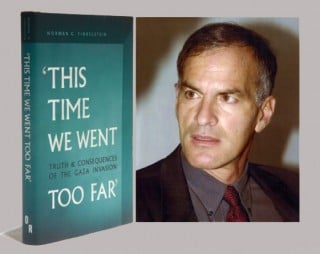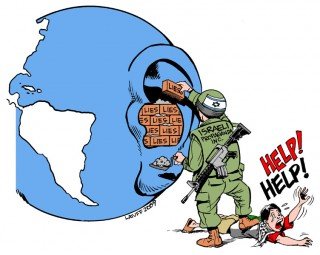DISCLOSURE: VT condemns the horrific tragedy committed by the NAZI Party against Jewish Citizens of Europe during Word War II known as the "Holocaust". VT condemns all racism, bigotry, hate speech, and violence. However, we are an open source uncensored journal and support the right of independent writers and commentors to express their voices; even if those voices are not mainstream as long as they do NOT openly call for violence. Please report any violations of comment policy to us immediately. Strong reader discretion is advised.

Pathbreaking scholars Norman Finkelstein and John Mearsheimer speak out about the precarious future of the Jewish state.
Greater Israel-or Peace?
Shortly before Palestinian Authority President Mahmoud Abbas arrived in New York to seek United Nations recognition of a Palestinian state, TAC’s Scott McConnell sat down with Norman Finkelstein and John Mearsheimer to discuss the deeper currents shaping the Israeli-Palestinian conflict. Since then, President Obama has given a speech shocking in its deference to Benjamin Netanyahu and Israel’s right-wing coalition, and there is no immediate prospect for renewed Israeli-Palestinian negotiations—the “peace process” begun with discussions in Oslo, Norway in 1991. Israel has announced fresh plans to move settlers into Palestinian areas of Jerusalem it conquered in 1967.
 As daunting as the prospects for peace may be, Israel no longer enjoys immunity from criticism within the American media and academy—thanks in large part to the work of scholars like Mearsheimer and Finkelstein, who have forced a debate among foreign-policy thinkers and the American left, over the price Americans, Israelis, and Palestinians all pay for Tel Aviv’s policies.
As daunting as the prospects for peace may be, Israel no longer enjoys immunity from criticism within the American media and academy—thanks in large part to the work of scholars like Mearsheimer and Finkelstein, who have forced a debate among foreign-policy thinkers and the American left, over the price Americans, Israelis, and Palestinians all pay for Tel Aviv’s policies.
One of America’s most important dissident scholars, Norman Finkelstein has written six books touching on the Israeli-Palestinian conflict. In 2007, after he had been recommended by DePaul University’s political science department and described by the university as an “outstanding teacher,” he was denied tenure thanks to an unprecedented lobbying campaign waged by Alan Dershowitz, who had long sparred with Finkelstein over Israel. Finkelstein is the child of European Jews who survived Auschwitz and Majdanek, which gave added force to his book The Holocaust Industry, critical of ways 
Israel has exploited the Holocaust for financial and political gain. His most recent work, This Time We Went Too Far, is an analysis of Israel’s 2008-09 war against the Palestinians in Gaza.
Professor John Mearsheimer of the University of Chicago is one of America’s foremost international relations scholars. He created a storm in 2006 when he and co-author Stephen Walt of Harvard University published the essay “The Israel Lobby,” which was later expanded into a best-selling book.
Scott McConnell: Have we come to the end of the Oslo process? Is a two‑state solution still a viable possibility?
Norman Finkelstein: The problem is the definition of terms. The Oslo process, contrary to what’s widely understood, was largely a success. It’s true now that it may be at an impasse, but as it was originally conceived, it was largely a success. The Israeli leadership was very clear about what it intended from the Oslo process.
Mainly, Rabin said—the former prime minister, Yitzhak Rabin—that if we can get the Palestinians to do the dirty work in the Occupied Territories, there’s going to be less pressure from human rights organizations. They wouldn’t cause as many problems if the Palestinians were doing the policing. And there was a military reason: namely, a large number of Israeli troops was bogged down in the Occupied Territories. That meant time taken away from military training.
The quid pro quo was, well, in 1990‑91 the PLO made what seemed to have been a tactical or strategic error by supporting Saddam Hussein, and they lost all of their funding from the Gulf States. And basically the United States and Israel threw them a life preserver, saying, “If you switch sides, you do what we want you to do, we’ll keep you alive.” That was the choice that the Palestinians made, or the Palestinian leadership made. But then a new problem arose, and that’s Hamas began to rise in power.
John Mearsheimer: The Israelis—and this was especially true of Rabin when the Oslo peace process got started—had no interest in giving the Palestinians a viable state. What they wanted was to restrict the Palestinians to a handful of Bantustans that were located inside of Greater Israel, and it could be called a Palestinian state. In a very important way, Oslo has been successful in that it has allowed the Israelis, working with the Palestinian Authority, to create a situation where the Palestinians have some autonomy in these Bantustans.
McConnell: You say this about Rabin too? He’s considered the most peace-oriented Israeli.
Finkelstein: He was the most rigid. Even Rabin’s wife, afterwards, during the Camp David negotiations, said that her husband would never have agreed to the concessions that [Prime Minister Ehud] Barak made. Now remember, Barak barely made any concessions. But she said her husband would have never agreed to that. I think she’s probably right. In Rabin’s last speech to the Knesset before he was assassinated, he said, “I don’t support a Palestinian state.” He said, “Something less than it.”
Mearsheimer: It’s also important to understand the American position since the Oslo process began has reflected very clearly the Israeli position. It was considered politically unacceptable in the United States to use the words “Palestinian state” until Bill Clinton’s last month in office.
The first time Bill Clinton uttered the words “Palestinian state” was in January of 2001. If you remember, in 1998 Hillary Clinton, who was then the first lady, said that she thought it would be very good for peace in the region if Palestinians had a state of their own. All hell broke loose. The president had to dissociate himself from his wife because it was so controversial. This was 1998, five years after the Oslo peace accords had been signed.
As unusual as this may sound, or as paradoxical as this may sound, it was actually George W. Bush who was the first president who really put the issue of a Palestinian state on the table. But even he realized that with Ariel Sharon as his counterpart in Israel there was no way he could push in any meaningful manner for the Palestinians to get a viable state of their own. And again, that’s the key to having a deal.
McConnell: Do you think there is a framework for a possible deal in the kind of negotiations that went on late in Barak’s term before Sharon’s election, at the 2001 Taba summit and things like that?
 Finkelstein: What you can say with a fair amount of generality is that if you look at the Taba map, and you look at the map that [Prime Minister Ehud] Olmert presented in 2006, they look the same. They all call for keeping about 9 percent of the West Bank, and they all call for keeping the large settlement blocs, what’s called Ariel in the north and Maale Adumim in the center. It is impossible to construct a Palestinian state with those maps.
Finkelstein: What you can say with a fair amount of generality is that if you look at the Taba map, and you look at the map that [Prime Minister Ehud] Olmert presented in 2006, they look the same. They all call for keeping about 9 percent of the West Bank, and they all call for keeping the large settlement blocs, what’s called Ariel in the north and Maale Adumim in the center. It is impossible to construct a Palestinian state with those maps.
Mearsheimer: Ariel reaches far out into the West Bank and actually sits on top of the largest aquifer in the West Bank, and it was put there for a purpose. Maale Adumim is designed to give Israel control well out into the heart of the West Bank. And the people who built those settlements understood full well that it would be almost impossible for any Israeli political leader to abandon them and turn them over to the Palestinians.
The reason that the Oslo peace process is dead and that you’re not going to get a two‑state solution is that the political center of gravity in Israel has moved far enough to the right over time that it’s, in my opinion, unthinkable that the Israelis would number one, give up the Jordan River valley; number two, abandon Ariel and Maale Adumim; and number three, allow for a capital in East Jerusalem.
So given all those factors, I think that we’re rapidly reaching the point—in fact, I think we’ve reached that point—where we’re going to have a Greater Israel which runs from the Jordan River valley to the Mediterranean.
Finkelstein: I don’t agree with that. There are many reasons to be pessimistic. But there are also some grounds for a reasonable amount of optimism. Things are changing in the region, and things are changing in the world. Like you say, the Israeli political establishment has moved to the right. The Israeli population has moved to the right, it has a siege mentality. But those are political factors.
And then the question is trying to change the calculus of power. Here things are changing. There are changes in American public opinion, which are quite significant when you look at the polls. There are changes in Jewish public opinion. There are major regional changes—what’s happening now between Israel and Turkey that’s part of an Arab Spring.
Mearsheimer: I think there’s no question that the international environment that Israel operates in is changing in profound ways, and developments in Turkey and Egypt are probably the best two examples of that. As a result of all this, Israel has a growing sense that it’s isolated, that it really only has one friend in the world, which is the United States.
Now the $64,000 question is whether that’s likely to lead Israel to be more flexible in the short to medium term, or is it likely to cause them to hunker down and be much less flexible and even more bellicose than they have been. And I would bet that the latter would be the case.
McConnell: What difference does it make that Turkey and Egypt are no longer de facto allies of Israel?
Finkelstein: I think a lot of it is psychological, and not psychological in the sense of Oprah psychological. It’s a whole way of relating to the region. Israel has the sense that this is its region. And it’s very disorienting for them to feel as if they’re losing control in that part of the world, that the natives are getting restless.
Mearsheimer: I put Norman’s point in slightly different terms, that is to say, I think what is at stake for the Israelis here is legitimacy, and I think that for them, and for most countries, legitimacy matters greatly. If you read the Israeli press, you’ll see there are all sorts of concerns about de-legitimization. And if you listen to people in the American Jewish community talk about what’s happening to Israel, they’re deeply concerned about de‑legitimization. What’s happening here with Turkey and with Egypt is that as those countries become more democratized and more critical of Israel, they’re adding fuel to that de‑legitimization fire.
There’s no question that most European governments will support Israel at the UN, and there’s certainly no question that the United States will. But the support in Europe, and even the support in the United States, is not terribly deep. It’s wide, right, but not deep.
Finkelstein: Actually support for Israel is no longer that wide. It used to be fair to say wide but not deep, wide and thin. But now if you look at the polls, it’s actually quite surprising. In Pew polls of the last few years, the negative opinion of Israel is kind of astonishing.
Mearsheimer: It’s right down there with Iran, North Korea…
Finkelstein: Well, it’s always ranked with Iran, North Korea, and Pakistan. They’re the four countries least liked in the world. But even if you take countries which have the strongest Israel lobbies—apart from the U.S., it’s Canada, the U.K., France, Germany, and Australia—look at the polls. Even in places like Canada, the polls show about 15 to 20 percent having a positive view of Israel, 60 or 70 percent having a negative view. Public opinion has really swung. Even in the U.S., by the way.
McConnell: Let’s try to tease this out, I mean, the number of Americans who consider themselves pro‑Israeli as opposed to pro-Palestinian has been kind of constant, like a 60 to 10 ratio, and hasn’t changed very much over a generation.
Finkelstein: Except—if you put it “pro‑Israel versus pro‑Palestinian,” that’s correct—if you look at it in terms of, “Do you have a positive or negative opinion of Israel?” for the first time in the last two or three years it’s come down to 50/50. It has changed.
Mearsheimer: I think that’s very important, but I think there’s an even more important indicator of how weak the support is. And that is that if you ask Americans if the United States should support Israel or the Palestinians in their conflict, roughly 70 percent, sometimes up to 75 percent, say we should favor neither side.
It’s really quite remarkable. We have this special relationship where we favor Israel axiomatically over Palestinians at every critical juncture. But here you have a situation where the American people, three-fourths of them, are saying that the United States should favor neither side. In fact, what the American people want to see is the United States act as a—what’s the word?
McConnell: Neutral arbiter.
Mearsheimer: Yeah, a neutral arbiter rather than as Israel’s lawyer.
When you think about how Americans deal with Israel, there are three dimensions to it. One is how people think about Israel and America’s relationship with Israel. Number two is how they talk about it, and number three is actual U.S. policy. There’s great variation among those three dimensions.
I think that over the past ten years how Americans think about Israel has changed in significant ways. More and more people are aware of what the Israelis are doing to the Palestinians. They understand that this is bad for the United States from a strategic point of view, and it’s morally bankrupt behavior.
There has been a significant change in the discourse as well over the past ten years. And that’s largely a result of the Internet. It’s very difficult for pro‑Israel forces to shape the discourse on the Internet the way they exercise great influence with the New York Times or CBS or even NPR.
So the discourse has really changed, especially when you get away from the mainstream media, which is increasingly less important. But what’s depressing is that U.S. policy has hardly changed at all. And the question you have to ask yourself is what does this mean for the long term. In a world where people are thinking very differently from the policy-makers and talking very differently from the policy-makers, how does this play itself out?
McConnell: Norman, you’ve been on this subject a long time, a whole career. I wonder if you could talk a little bit about the beginning of your involvement and whether you’ve sensed a change in response to what you say compared to the way it was 20 or 30 years ago, or 10 or 15 years ago?
Finkelstein: I’m sort of second generation. I think the Edward Said, Noam Chomsky generation was first—that was the generation of the ’70s, where it was really virtually impossible to say anything on the topic without being ostracized. I came in right after the Lebanon War of June 1982. And the Lebanon War was Israel’s first public relations disaster in the United States, at least after the ’67 War. They took a big blow back then. It’s forgotten, but it was a PR disaster. Immediately afterwards they tried to recoup from it.
Actually, one of the initiatives they took to recoup was how I got started. I think the Joan Peters book From Time Immemorial was simply a propaganda exercise to try to recoup from the ’82 war.
The next big change occurs with the 1987 Palestinian Intifada, which I think had a very substantial impact, though it was temporary, on public opinion in the United States. I was already teaching by ’88. And I remember in my class—I was at Brooklyn College at the time—a student who was not particularly political, he was what you’d call a typical white ethnic, he was either Irish or Italian, from Bay Ridge or Bensonhurst, he said in class, “Stone vs. Uzi, that doesn’t sound fair.” And that was the image that was being projected then.
The next big turning point probably came with the Second Intifada, which had a very negative impact because of the suicide bombings. But it also had a positive impact because the Israeli repression was so terrible; again, it alienated significant numbers of people.
As for myself, I don’t know if you were familiar with the lingo from back in the ’30s and ’40s, but there were all of these young Americans, many of whom incidentally were Jewish, in the Abraham Lincoln Brigade, who went to go fight fascism in Spain. And at that point, to fight fascism made you pro‑Communist, because—you know the whole thing. And then they went to fight in World War II again.
So they come back, and a lot of them are called before [Sen. Joseph] McCarthy, the very same people who fought in World War II. And why were they called before McCarthy? Well, they called themselves premature anti‑fascists. They were anti‑fascists before it was politically correct to be anti‑fascists because they were anti‑fascist at the time of Franco, and at that time the Americans supported Franco.
So even though personally my political positions aren’t really radical at all, and even though I don’t particularly like the nomenclature, I say I was a premature anti‑Zionist.
Mearsheimer: Can I ask Norman a quick question…
McConnell: Yeah, sure.
Mearsheimer: …which I think is important to readers and for me and Scott. You say that you’re an anti‑Zionist.
Finkelstein: No, I don’t. I say I don’t like the nomenclature.
Mearsheimer: You said you were an anti‑Zionist before your time.
Finkelstein: I said that just to make the parallel with anti‑fascist.
Mearsheimer: But here’s the question. Do you, Norman Finkelstein, think it’s a good thing there’s a Jewish state?
Finkelstein: No. But I don’t think it’s a good thing to have Christian states, Muslim states, or any kind of ethnic states. There is a difference between saying… remember let’s be clear about what the UN said. The UN said, “We want to create a Jewish state and an Arab state in Palestine.”
Mearsheimer: Right.
Finkelstein: But then the UN went on to say, and it was very explicit in the recommendation, “There cannot be any discrimination whatsoever in the Jewish state against an Arab minority.” Now, you may ask the reasonable question, “Well, if there can’t be any discrimination whatsoever, what do they mean by a Jewish state?” They never answer that.
But it doesn’t necessarily follow from the idea that you say there should be two states that you believe it should be a Jewish state or that you’re a Zionist. There’s no connection between the two.
Mearsheimer: I was just interested in what your preferences were.
Finkelstein: I think one of the problems when we discuss the Israel‑Palestine conflict is people talk too much in terms of “What’s your preference?”, like politics is a Chinese menu—I’ll take one from column A and two from column B. That’s not what politics is about.
Politics is about what is realistically possible in terms of your long‑term values, your philosophical perspective. What is really possible now in my opinion are two states, basically what people call the international consensus. It doesn’t mean it’s my philosophical preference. If you asked me, I’d say I would like to see a world without states.
McConnell: When does a two-state solution become not realistically possible?
Mearsheimer: The reason that people continue to talk about a two‑state solution even though I think it’s no longer realizable is that many Palestinians don’t see a viable alternative; they don’t think that a one‑state solution will work.
And in the case of many Israelis and their American supporters, they’re basically sticking their heads in the sand because they don’t want to talk about a one‑state solution, because they understand that a one‑state solution is basically an apartheid state.
Finkelstein: You know, I can see John’s point, but we have to be clear about what John’s point is. He was talking about political facts and political will. He said that the political spectrum has shifted in Israel and that it’s going to be very hard to get these people to budge.
Yes, that’s true. It’s going to be hard to get them to budge, but the problem is, to put it simply, it’s never been tried. The only time it really was tried to get them to budge was the First Intifada, and you know, the First Intifada was very sobering for Israel.
I lived there during the First Intifada. I used to go every summer. You’d be very surprised what it looked like. They had to have 500,000 troops there. When you went in the Occupied Territories then, you saw 65‑year‑old men—they had to bring up all their reserves, and they were putting in six months.
Once there is a real mass action and summoning of will, you may see things shift in Israel. It’s just not been tried. All that’s been tried is this thing called a “peace process.” Nothing happens because there was no pressure on them; the Israelis treat the whole thing like a joke.
Mearsheimer: A lot has changed since 1987 when the First Intifada broke out. First of all, there are many more settlers. And if you leave 60-plus percent of those settlers, you still have to remove…
Finkelstein: 200,000.
Mearsheimer: Right. You still have to remove a…
Finkelstein: If you look at the polls, the polls vary. But as high as 60 percent say they’re willing to be bought out. The Israeli expression is “quality of life settlers.” They just moved there because Israel gave them tons of mortgage subsidies and everything. They say, “Give us money, we’ll leave.”
Mearsheimer: But the fact is that if 40 percent of the settlers were to resist removal, it would be incredibly bloody.
Finkelstein: Yeah, but then you look at the polls, and the polls say about 10,000 or 15,000 would resist violently. The rest say they would oppose it, but if the army gives an order, “You have to leave,” only about 10,000 or 15,000 say that they would resist violently. In my opinion that’s mostly bravado. The actual number will probably be several thousand.
And then the Israeli former security people say there’s a really easy way to handle them: all we’ll do is say, “We’re leaving. You want to stay in Hebron with 160,000 crazy Arabs? Stay. We’re going.” And the Israeli security people say, “You’ll see how fast they’ll leave.”
Mearsheimer: Your point that pressure has not been brought to bear on the Israelis up to now is correct. But the reason that pressure has not been brought to bear is because the United States protects Israel at every turn. If the United States were willing to put serious sanctions on Israel, there’s no question that we could get Israel to move to a two‑state settlement very quickly.
And by the way, that would be good for Israel, good for the Palestinians, and good for us. And the fact that we don’t do it is really quite shocking because it’s a win‑win‑win situation.
Finkelstein: Correct.
Mearsheimer: But then the question is, who’s going to put pressure on Israel?
Finkelstein: That’s why I said there are new factors. It is true that the U.S. is the key factor, but now with the Arab Spring there are regional factors. For a lot of the Arab countries, or a lot of the Arab leaders, this has become a drain on them. Turkey and Egypt, they want to modernize and this Israel/Palestine thing is a drain on them. They have a real incentive to want to resolve it.
But the other thing is, as we’ve all agreed, there are changes in public opinion. The challenge is translating the changes in public opinion into some sort of political force. There is raw material; it still requires work. It’s a hard job, but our possibilities now are greater than ever.
Mearsheimer: Yeah. I hope that you’re right, but I think that you’re wrong. The reason has to do with how American politics works. The way this political system of ours was set up in the beginning gave huge amounts of influence to interest groups, interest groups of all sorts.
In the present situation, interest groups that have lots of money can influence the political process in profound ways. The principal reason that we don’t have any financial reform after the 2008 financial crisis is, in large part, because of the interest groups or lobbies associated with the financial industry. They’re just so powerful in Washington that Congress really can’t stand up to them. As a result, we’ve done very little to fix the system that caused this disaster in 2008.
When it comes to foreign policy, we, of course, have interest groups—like the Cuban lobby, the Israel lobby, the Armenian lobby—that can wield lots of influence. In this day and age, where money really matters, and where the Israel lobby has lots of money to throw at political candidates, it is very easy for it to get its way. And foolishly, in my opinion, the lobby tends to support the hard-line policies of Israel, which I don’t think are in Israel’s interests.
The end result is that virtually nobody on Capitol Hill will stand up to Benjamin Netanyahu. And the president won’t either.
Finkelstein: Everything you said, of course, is true and I don’t bury my head in the ground. The only addition to what you said is, I haven’t seen any real attempt to challenge the lobby. There’s never been a serious opposition in Washington. They’ve never had to contend with anybody.

It is true money talks. No question about it. But then we don’t know how many people in Congress—I know you may react cynically to it—but we don’t really know how many are just misinformed. They just don’t know what’s going on because there’s nobody on the other side doing anything. How many people in Congress are really sick of the bribery and bullying of AIPAC, but there’s nobody with whom they can stand? There’s no lobby here.
It’s work that we have to do. And then, once we have done our part and nothing budges, I’ll see your side. But it’s the same thing with the Palestinians. I saw what happened during the First Intifada. The Israelis were in a complete panic. They didn’t know what to do. They didn’t know if they were coming or going. The people had real power.
McConnell: My fear is that Israel, if they were faced with a third Intifada as a result of, say, the dead‑end of the Palestinian‑UN thing, would welcome it.
Mearsheimer: It’s very clear that when the Palestinians turn to terrorism it works to Israel’s advantage. It makes much more sense for the Palestinians to pursue a Gandhi‑like policy. The other reason that the Palestinians do not want to turn to terrorism or to a third Intifada is the threat of further expulsion. I believe that there are lots of Israelis who would welcome an opportunity to drive the Palestinians…
McConnell: Across the Jordan River. Yeah.
Mearsheimer: …out of Greater Israel and solve the demographic problem that way. The reason I believe that Israel is in such trouble over the long term is that you’re going to end up with a Greater Israel, where there are going to be more Palestinians than Israeli Jews.
In fact, I think I could make a convincing argument that right now there are more Palestinians than Israeli Jews living between the Jordan and the Mediterranean. But certainly 20 years down the road, the numbers are going to clearly favor the Palestinians, and I believe that will be an apartheid state. It will be impossible for Israel to maintain that state.
McConnell: What keeps Israel from trying to push the Palestinians out of the West Bank?
Finkelstein: I remember during the Second Intifada, I had a several hour conversation with Rantissi, who was the head of Hamas—he was subsequently assassinated by Israel. And I said to him, “You know, these suicide bombings, they just give Israel the pretext to commit massacres.” And he said to me, “Israel does what it wants. It doesn’t need pretext.” I said to him, “If Israel did what it wanted to do, none of you would be here.”
Israel has real constraints and limits imposed on it by international public opinion. People are very naïve about that. Even the Gaza massacre, the Israeli invasion of 2008 to 2009, okay, it was terrible. No question about it. Killed 1,400 people. Lebanon 2006, July, August, it killed 1,200 people, 1,000 civilians. It was horrible. But it was really small potatoes next to Lebanon 1982. Lebanon ’82, the estimates are they killed between 15,000 and 20,000 people. That’s a big difference because the limits have increased on them.
Mearsheimer: And what has increased the limits?
Finkelstein: Well, public opinion has put real constraints on what Israel can do, even though what it did in Gaza was terrible, I’ll be the first one to say. It’s still much less than they were once able to get away with. Every time there’s a war, they have been hoping to do a mass expulsion: during that attack on Iraq in 2003; they were hoping to do it in 1990–91. If you read the Israeli newspapers, they’re always talking about the transfer. They can’t do it because public opinion puts real constraints on them.
I think sometimes we underestimate just how vulnerable Israel is on the public-relations front. That’s why they spend so much money on propaganda. And that’s why they panic every time they feel like they’re losing the propaganda war. Because they realize just how vulnerable they are and how big the constraints on them are. Otherwise it makes no sense why they invest so much in that image of theirs.
Mearsheimer: When Norman says that Israelis and their supporters in the United States care greatly about what people think about Israel, I think that’s a further way of saying they’re worried deeply about Israel’s legitimacy. And this is why people like Norman and people like me, and Steve Walt, and Jimmy Carter, and Noam Chomsky, and Edward Said are viewed as being so dangerous to Israel. When Norman tells you about all the times he’s been blacklisted and mafia‑like tactics have been used on him, basically what’s going on there is that the lobby is interested in marginalizing him and silencing him because it knows how dangerous he is.
Israel’s greatest advantage in the world today is in terms of its material resources. It’s a rich country that has one of the most formidable militaries on the planet. And of course, it’s joined at the hip with the United States, which has the most formidable military in the world.
But where Israel is particularly weak and is threatened is in the realm of ideas. I like to think about this in Gramscian terms. Gramsci used to talk about wars of ideas. What’s happened here is that as the material balance of power has moved in Israel’s favor, the balance of ideas has moved against Israel.
People like Norman, who are what I like to call the “corridor cutters” on this issue, help in a major way, pushing in that direction. Then people like Jimmy Carter, Steve Walt, and I came along and stood on the shoulders of people like Norman. All of us have been attacked, viciously attacked in some cases, and ostracized in other cases because we are viewed as a threat.
Again, it all gets back to that important concept of legitimacy.
McConnell: There’s some voice in me, not mine, but I can hear a voice saying if you’re a realist in terms of power politics, ideas matter much less than military/economic strength and things like that.
Mearsheimer: The truth is sometimes ideas don’t matter very much, and sometimes they really do. This is a case where ideas do matter. What the Israelis are doing to the Palestinians has become an important part of our discourse about the Middle East. It simply does not work to Israel’s advantage. My argument is that this situation is only going to get worse over time. Israel is going to be more isolated, and the United States, which of course backs Israel at every turn, is going to be increasingly isolated as well.
Finkelstein: On the strictly military plane, it is true Israel is very powerful. But we should also bear in mind that it’s become a very modern country. One of the consequences of becoming a modern country is people don’t want to die. Israel has a very effective, automated military. But when it comes to actual battlefield engagement, the Israeli soldiers don’t want to fight.
McConnell: What happened in Lebanon in 2006?
Finkelstein: It’s very clear Israel did not launch a major ground offensive for one reason: it did not want to take a large number of casualties. Lebanon proved to be for them a complete disaster. Now they make claims—there’s a tiny bit of truth to it—their claim was that because they were bogged down during the Second Intifada in policing action in the West Bank, there had been no time for rehearsals for ground/air coordination and that’s why things went so badly in Lebanon.
There’s a little bit of truth to it, but a bigger truth is Hezbollah people, they’re ready to die. They’re not afraid to go out there and get killed. The Israelis don’t want to get killed. The same thing happened in Gaza. Gaza was a—there was no war. As one person put it, it was like a child with a magnifying glass burning ants. It was all a high‑tech war.
Once a friend of mine—she’s an Israeli, I went to high school with her—she was very offended, and she said why did I call Israel a modern‑day Sparta? She says, “You don’t know Israelis. They’re not Sparta. They like the Beatles. They like this, they like that.” I said, “You misunderstood what I said. I said a high‑tech Sparta.” Because it’s true, they are not Spartans. They like cafes. They like the good life.
Mearsheimer: They like unfair fights.
Finkelstein: They want to live.
Mearsheimer: But I think there’s a more important point at play here, which is not to say this point is not important. As Israel becomes a modern economy, and you have more and more people who are secular, wealthy, and like to lead the good life, what begins to happen is that they begin to think about the exit option. They think about leaving Israel. Because they don’t want to live in Sparta. They’d much prefer to live in Europe or in the United States.
McConnell: Are you guys surprised by how quickly Obama seemed to have climbed down from making a solution to the conflict a top priority? By all indications he was someone who understood the moral and political case for a Palestinian state.
Mearsheimer: He did not step away from the problem quickly. Shortly after taking office in January 2009 he began to put pressure on Israel—throughout 2009, throughout 2010, and even earlier this year Obama was putting pressure on the Israelis.
That of course is why Netanyahu came to Washington and spoke before AIPAC and spoke before Congress and went toe to toe, in effect, with Obama. The sad truth is that Netanyahu beat him at every turn, and now with the election looming and the economy in shambles, Obama is in no position to pick a fight with Israel.
Finkelstein: Even if Obama prevailed over Netanyahu, the settlement he was calling for was roughly that map where Israel would keep about 10 percent—9 or 10 percent—of the West Bank, including all the major settlement blocs.
If you include the settlement blocs, like Maale Adumim, there’s no state because the way that settlement bloc is constructed, it separates Jerusalem from the whole West Bank. So you have this little island of Jerusalem. Metropolitan Jerusalem is about 30 to 40 percent of the Palestinian economy. If you separate Jerusalem, there’s no state. Even if Obama prevailed and you got the 10 percent map, it still has no relationship to what a viable Palestinian state would look like.
Mearsheimer: I don’t think, Norman, that it’s clear whether Obama was thinking in terms of what’s called the Israeli map or whether he was thinking in terms of the Palestinian map. But I believe that most of his Middle East advisers and Obama understand that the only way we’re going to solve this is to give the Palestinians a viable state, and that means basically the Palestinian map.
Finkelstein: No, I don’t think that’s true, John. I mean…
Mearsheimer: Then I wonder why you’re so optimistic that we can solve this one?
Finkelstein: Oh, because as I said, I totally agree with you on Congress. I totally agree with you on the executive. On those points there’s no disagreement at all. What I said is there is a changed political configuration now. There are changes in public opinion. There are changes in Jewish opinion. There’s a lot of work to be done. But there are reasons to be optimistic.
McConnell: Can you elaborate on the changes in Jewish opinion?
Finkelstein: Trying to understand Jewish relationships with Israel, there are three factors. There is the ethnic factor, which is the one people tend to home in on—Israel, Jewish State, of course Jews love Israel. That’s how people usually reason.
There is a second factor. That’s the citizenship factor, namely American Jews are American citizens, and they have a good life here, and they are very wary of being hit with the dual-loyalty charge. So wherever it looks like there are tensions between the U.S. and Israel, or tensions might be brewing, Americans Jews are very cautious and very wary.
That was very noticeable between ’48 and ’67, when American Jews had no interest whatsoever in Israel. It’s easily documented. Even those people who subsequently became Israel’s supporters, like Norman Podhoretz—if you look at Commentary magazine, as I have, between 1960 and 1967, there’s virtually nothing on Israel.
And then there’s the third factor. It’s the ideological factor. American Jews are liberal. They are liberal Democrats ever since Roosevelt in ’32. Last presidential election, 80 percent of Jews voted for Obama. More Jews voted for Obama than Latinos voted for Obama. American Jews are liberal, and they vote liberal and Democratic. Now for a long time on this ideological level, they were able to reconcile being liberal with being supportive of Israel, because Israel was the light unto the nations, bringing Western civilization to the barbaric East…
Mearsheimer: Only democracy.
Finkelstein: Only democracy in the Middle East, and all the rest. Well, in the last ten or 15 years, it’s wearing thin, and American Jews are having a lot of trouble as liberals—especially young American Jews on college campuses, which tend to be more liberal than American society in general—they’re having a lot of trouble reconciling their liberal beliefs with the way Israel carries on, and Israeli conduct and Israeli society in general.
And therefore you can see in a lot of polls—the best pollster in the American Jewish community, by a far margin, is Stephen Cohen. And Cohen says, “Support for Israel is dying.” He claims it’s dying because of intermarriage; you know, the ethnic factor. Jews are now intermarrying at a rate of about 6o percent. He says that it’s obvious that among the intermarried Jews, interest in Israel tends to plummet. And again, there’s a lot of statistical evidence. The intermarriage factor is significant. But I think as big a factor now is the liberalism factor. They just can’t do it anymore.
Mearsheimer: This is the Peter Beinart thesis.
Finkelstein: No, that’s the Norman Finkelstein thesis, which Peter Beinart took. [laughter]
Finkelstein: Because I was working on it since 2007. You know, I lectured very widely on it. I wrote a book. I started the book. It was called A Farewell to Israel: The Coming Break‑up of American Jewish Support for Israel. I’ve since re-titled it. It’s now called Knowing Too Much because I think that’s the problem. American Jews now know too much. They don’t know what to do with it.
McConnell: And Birthright Israel isn’t enough to counter this?
Finkelstein: It’s not enough, no, because Birthright Israel, first of all, is self‑selective. Many of them are just…
Mearsheimer: It’s propaganda. It’s very hard to propagandize Jews. They’re very knowledgeable, and they’re critical thinkers.
Finkelstein: That’s the other thing. All of the scholarship that comes out—those are the sectors where Jews tend to be, in the highly educated, literate sectors. That information is reaching them, and they don’t know what to do with it. You can see it in colleges now. It used to be when someone like me would come speak, it would be hysteria, with the audience shouting and screaming. Then they realized, “Well, we don’t really want to do that anymore.” So they would start having vigils outside and passing out leaflets.
Now, nothing. Nothing. There’s only one way they can work now: behind the scenes. They try to put pressure to not invite him because he’s this or he’s that. Behind the scenes they’re working very hard, but in the public arena—in the court of public opinion—they have vanished because it’s hopeless. How do you defend it?
They don’t like me, not because of my beliefs, they don’t like me because they know I’m going to have the facts. I read. I patiently go through all the reports. That’s what they fear. It’s not my politics because, as I said, my politics are not radical. It’s the facts. They’re in dread of that because there’s no defense anymore.
McConnell: How much are you speaking now on campuses?
Finkelstein: Quite a lot. Let’s put it this way: I could easily speak every day, if I were to accept every invitation, but it’s impossible because my forte is knowing the facts, which means I have to sit home and work. I have to read. I don’t want to become a rhetorical speaker. My effectiveness is mastering all of the data and being able to respond.
People ask me, “Why don’t you ever lose your cool? Why don’t you get angry? I get so angry.” I say, “Because the reason you get angry is frustration. You know what the other person is saying is not true, but you don’t know how to answer it. You don’t know the facts, and that’s where the anger and frustration come from.”
When you know how to answer it, you just sit very patiently. You’ll get your turn, and then you’ll answer. That’s why I can’t accept all the speaking engagements, because I’ve got to know the facts. Then we’ll be effective, and I still say we could win. John knows that, because I saw that you can have very big meetings at the University of Chicago, which has a very large Jewish population. There was one meeting where John and I were present, I don’t remember which one it was.
Mearsheimer: Yeah, it was during operation Cast Lead in January 2009.
Finkelstein: It must have been what? 1,500 people?
Mearsheimer: It was a huge audience. They turned away, I think, 800 people.
Finkelstein: And they can’t answer, the other side. There’s nothing. Nothing. And that’s what’s causing a lot of Jews—that’s, for me, what’s breaking up the whole support. It’s like—oh, what’s his name?—David Remnick said a few months ago. He said, “How long is this occupation going to go on?” He said, “I can’t take it anymore.” But what he really meant was, “I can’t justify it anymore.” How do you justify it?
Sources: Official website of Norman G. Finkelstein
http://www.theamericanconservative.com/blog/greater-israel-or-peace/
Edited by: Debbie Menon
Veteran Journalist Robert Fisk Speaks–
About Sabra & Shatila massacre in this short clip:
Channel 4 News — Exclusive IDF Interview

Debbie Menon is an independent writer based in Dubai. Her main focus are the US-Mid- East Conflicts. Her writing has been featured in many print and online publications.
Her writing reflects the incredible resilience, almost superhuman steadfastness of the occupied and oppressed Palestinians, who are now facing the prospect of a final round of ethnic cleansing. She is committed to exposing Israel’s Lobbies’ control of ‘U.S. Middle East Policy. Control’ which amounts to treason by the Zionist lobbies in America and its stooges in Congress, and that guarantees there can never be a peaceful resolution of the Israeli-Palestinian conflict, only catastrophe for all, in the region and the world.
Her mission is to inform and educate internet viewers seeking unfiltered information about real events on issues of the US/Middle East conflicts that are unreported, underreported, or distorted in the American media. PS: For those of her detractors that think she is being selective and even “one-sided,” tough, that is the point of her work, to present an alternative view and interpretation of the US-Israel-Middle East conflict, that has been completely ignored in mainstream discourse.
The purpose is to look at the current reality from a different and critical perspective, not to simply rehash the pro-US/Israel perspective, smoke and mirrors that has been allowed to utterly and completely dominate Mainstream discourse.
ATTENTION READERS
We See The World From All Sides and Want YOU To Be Fully InformedIn fact, intentional disinformation is a disgraceful scourge in media today. So to assuage any possible errant incorrect information posted herein, we strongly encourage you to seek corroboration from other non-VT sources before forming an educated opinion.
About VT - Policies & Disclosures - Comment Policy






